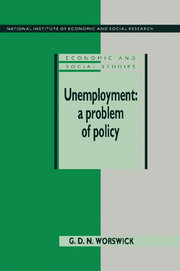Book contents
- Frontmatter
- Contents
- List of tables
- List of charts
- Preface
- 1 INTRODUCTION
- 2 CONCEPTS AND MEASUREMENTS
- PART 1 STRUCTURAL CHANGE
- PART 2 THE WAGE QUESTION
- PART 3 MACROECONOMIC POLICY
- 12 THE THEORETICAL BACKGROUND
- 13 EVIDENCE RELATING TO THE ECONOMY
- 14 EVIDENCE RELATING TO POLICY
- 15 REFLECTIONS ON MACROECONOMIC POLICY
- PART 4 INTERNATIONAL DIMENSION
- Appendix to Chapter 8: The puzzle of the apparent fall in United States real wages
- Notes
- List of works cited
- Index
- THE NATIONAL INSTITUTE OF ECONOMIC AND SOCIAL RESEARCH PUBLICATIONS IN PRINT
15 - REFLECTIONS ON MACROECONOMIC POLICY
from PART 3 - MACROECONOMIC POLICY
Published online by Cambridge University Press: 06 July 2010
- Frontmatter
- Contents
- List of tables
- List of charts
- Preface
- 1 INTRODUCTION
- 2 CONCEPTS AND MEASUREMENTS
- PART 1 STRUCTURAL CHANGE
- PART 2 THE WAGE QUESTION
- PART 3 MACROECONOMIC POLICY
- 12 THE THEORETICAL BACKGROUND
- 13 EVIDENCE RELATING TO THE ECONOMY
- 14 EVIDENCE RELATING TO POLICY
- 15 REFLECTIONS ON MACROECONOMIC POLICY
- PART 4 INTERNATIONAL DIMENSION
- Appendix to Chapter 8: The puzzle of the apparent fall in United States real wages
- Notes
- List of works cited
- Index
- THE NATIONAL INSTITUTE OF ECONOMIC AND SOCIAL RESEARCH PUBLICATIONS IN PRINT
Summary
In our review of the evidence concerning macroeconomic policy, we divided the postwar period at 1973, characterising the first part as a Golden Age. Rates of growth of output and productivity were higher, and in some cases much higher, than ever previously experienced. The biggest increases were in Japan and Europe. Unemployment rates were not only far below those of the 1930s, but in most cases lower than in any previous peacetime period of any length. The United States was something of an exception. While the level of its productivity was the highest, there was no spectacular improvement in its growth rate, nor, leaving aside the Depression, was its unemployment unusually low. Britain's productivity growth was less than that of Japan and of its European neighbours, but higher than its own previous best. World trade grew faster than ever before. The view we took was that demand management by governments made a positive contribution to the high levels of employment. There was a continuous and persistent inflation, a quite new peacetime phenomenon in the industrial world, and official reports, national and international, at intervals expressed concern. But as Galbraith (1958) observed: ‘Where inflation is concerned nearly everyone finds it convenient to confine himself to conversation. All branches of the conventional wisdom are equally agreed on the undesirability of any remedies that are effective’.
Yet it was the first of two bursts of inflation which marked the end of the Golden Age in 1973, and ushered in the second phase of slower growth, higher inflation and higher unemployment.
- Type
- Chapter
- Information
- Unemployment: A Problem of PolicyAnalysis of British Experience and Prospects, pp. 174 - 182Publisher: Cambridge University PressPrint publication year: 1991



